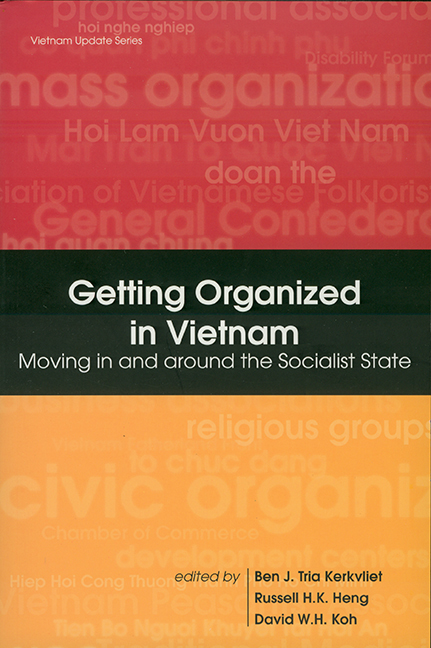Book contents
- Frontmatter
- Contents
- Preface
- Abbreviations
- Introduction: Grappling with Organizations and the State in Contemporary Vietnam
- 1 From Fence-Breaking to Networking: Interests, Popular Organizations, and Policy Influences in Post-Socialist Vietnam
- 2 Business Associations and Policy-Making in Vietnam
- 3 NGOs and Highland Development: A Case Study in Crafting New Roles
- 4 The Disabled and Their Organizations: The Emergence of New Paradigms
- 5 Authoritarian Governance and Labour: The VGCL and the Party-State in Economic Renovation
- 6 The Relationship between Civic and Governmental Organizations in Vietnam: Selected Findings
- 7 Donors, Local Development Groups and Institutional Reform over Vietnam's Development Decade
- Index
- About the Contributors
2 - Business Associations and Policy-Making in Vietnam
Published online by Cambridge University Press: 21 October 2015
- Frontmatter
- Contents
- Preface
- Abbreviations
- Introduction: Grappling with Organizations and the State in Contemporary Vietnam
- 1 From Fence-Breaking to Networking: Interests, Popular Organizations, and Policy Influences in Post-Socialist Vietnam
- 2 Business Associations and Policy-Making in Vietnam
- 3 NGOs and Highland Development: A Case Study in Crafting New Roles
- 4 The Disabled and Their Organizations: The Emergence of New Paradigms
- 5 Authoritarian Governance and Labour: The VGCL and the Party-State in Economic Renovation
- 6 The Relationship between Civic and Governmental Organizations in Vietnam: Selected Findings
- 7 Donors, Local Development Groups and Institutional Reform over Vietnam's Development Decade
- Index
- About the Contributors
Summary
Since doi moi began in 1986, the Vietnamese political authorities have implemented reforms aimed at expanding the scope and modalities of interest representation in Vietnam. These reforms can be seen in official efforts to rejuvenate traditional mass organizations, to encourage the development of new representative groups in sectors where mass organizations do not exist, and, especially, to intensify the participation of these organizations in policy and law-making. During the 1990s, it became common for government-appointed drafting committees to distribute draft laws to mass organizations and other groups, such as the Vietnam Chamber of Commerce and Industry (Phong Thuong Mai va Cong Nghiep Viet Nam), in order to solicit comments on the content of drafts. In 1994, Adam Fforde summed up these changes succinctly by observing that “public organizations such as the Chamber of Commerce and Industry… have been given scope to voice political opinions and participate in law-making. Thus mechanisms have been created for criticizing, drafting and redrafting laws as an overt means to ‘change the rules.’ ” By the late 1990s, the government was facilitating more direct business representation in law-making by inviting leaders of the Chamber of Commerce to serve as official members of legislative drafting committees.
This chapter argues that the changing role of business associations and other groups is indicative of an emerging “corporatism” in Vietnam. Broadly speaking, corporatism may be defined as a pattern of organizing interests and influence in which the state gives favoured status to certain interest groups. This institutional pattern typically involves tripartite consultations among representatives of business, labour, and government over economic policy. The state may grant representational monopolies to interest groups within their respective economic sectors or social categories, but, in exchange, these groups must operate within parameters determined by the state and often through leaders chosen or approved by the state. Sometimes the state itself even creates the interest groups.
- Type
- Chapter
- Information
- Getting Organized in VietnamMoving in and around the Socialist State, pp. 62 - 109Publisher: ISEAS–Yusof Ishak InstitutePrint publication year: 2003

